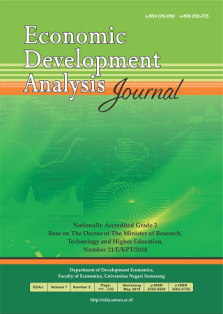Does Minimum Wage Reduces Gender Inequality in Indonesia?
Abstract
Gender inequality is a persistent challenge in many societies, reflecting disparities in access to resources, opportunities, and decision-making power between men and women. One policy area that has garnered significant attention in the quest for gender equality is the minimum wage. By setting a wage floor for all workers, minimum wage policies aim to enhance the economic well-being of low-income individuals, a group in which women are often overrepresented. However, the relationship between minimum wage policies and gender inequality is complex, and its impact remains a subject of extensive debate and research. This research investigates the impact of annual minimum wage policy changes in Indonesia on gender inequality using a dynamic panel data approach encompassing 34 provinces over eight years (2015-2022). Contrary to expectations, the results suggest that both in the short and long run, minimum wage policy increases gender inequality. This highlights the complexity of the relationship between minimum wage adjustments and gender dynamics, underscoring the need for nuanced policy design to ensure gender equality in labor market outcomes.


